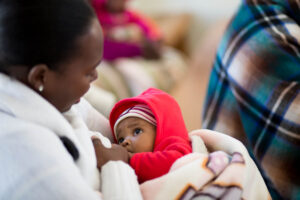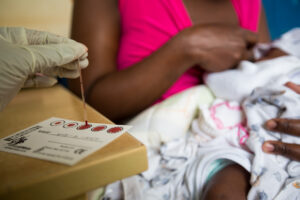The Importance and Benefits of Exclusive Breastfeeding
The Importance and Benefits of Exclusive Breastfeeding
As we start a new year, we are reflecting on the importance for all children to have the best start in life, and how breastfeeding can help provide this, no matter where you live in the world. There is no question, breastfeeding can be challenging for any mother—from getting baby to latch correctly, to ensuring adequate milk supply, to feeling judged for breastfeeding in public. An ongoing lack of information and outdated perceptions mean mothers living with HIV face additional challenges.

Breast milk contains all of the nutrients an infant needs and strengthens their immune system, which is why mothers2mothers (m2m) works so hard to ensure that our clients —both those who are living with HIV and those who are HIV-negative—have all the support they need to breastfeed freely and successfully.
All too often, it’s not common knowledge that women living with HIV can breastfeed safely. In fact, the World Health Organization (WHO) recommends that women living with HIV in resource-poor settings exclusively breastfeed their babies for at least six months, meaning they only receive breast milk. Many women don’t know why exclusive breastfeeding is so critical during this time and how to overcome the challenges they face. That’s why the work that Mentor Mothers like Maamohelang Nkholise from Lesotho, who is employed by m2m as a frontline health worker, is so important to our clients. We sat down with Maamohelang to ask her some of the most common questions about breastfeeding.
Is exclusive breastfeeding safe for mothers living with HIV?
Yes, breastfeeding is safe for mothers living with HIV. The milk is nutritious and combining exclusive breastfeeding with effective and consistent antiretroviral treatment, means the risk of the mother passing the virus on to her child is extremely low. We teach our clients to get started on treatment and make sure that they take their medication every day. For additional protection, the children are also placed on treatment until they are weaned.
The most important thing we teach our clients is to make sure that they exclusively breastfeed for the first six months. This is because, in those first months, the child’s stomach is still developing, and if the mother gives them anything else than breastmilk, that can cause small tears in the stomach lining, and create space for HIV to enter the child’s blood stream.
After six months, the mother can start introducing solid foods and other drinks, like formula milk. By that time, the risk of passing on the virus is much, much lower.
What challenges do your clients face in relation to exclusive breastfeeding?
The biggest challenge my clients face regarding exclusive breastfeeding is pressure from family. Traditionally, in Lesotho, babies are given traditional medicines and water in the very first days after birth. Many families believe that this is important for the child’s development and protection. This is sometimes difficult for clients to explain to their elders. This why it is so important for Mentor Mothers like us to be working directly with the whole family. In that way, we educate the entire household about safe breastfeeding, and reinforce the information we give to mothers at the clinic.
Fortunately, the families do listen to Mentor Mothers. They know that we live in the same community, and know that their Mentor Mother fully understands their way of life. The fact that they see m2m Mentor Mothers at the clinic, makes us a trusted source for information.
How have your clients benefitted from breastfeeding?
Many women we serve are unemployed. Buying milk formula is very expensive for them. Breastmilk is free and always available, and it takes some of the financial pressure off families. If the mother has to be away from her baby, she can always express the milk and have someone feed the baby. Most importantly, breastmilk is full of antibodies and nutrients that protect the baby from illnesses. Whenever we explain this to our clients, they get excited and want to start breastfeeding.
Can a mother still safely breastfeed if they have COVID-19?
A mother can still safely breastfeed if they have tested positive for COVID-19. Fortunately, the breastmilk itself does not contain any traces of COVID-19, and the baby will continue to benefit from the nutrition they get from the breastmilk.*

Mentor Mothers teach breastfeeding mothers, just like everyone, to always protect themselves from contracting the coronavirus. Whenever they do their follow-up calls or home visits, the Mentor Mother asks them if they are experiencing COVID-19 symptoms, and remind them to get tested as soon as possible if they are showing any symptoms.
For Maletsie, one of Maamohelang’s clients, this support has created special moments for her and her little one:
“I got support from the Mentor Mothers at the Nazareth Health Centre on how to exclusively breastfeed, without affecting the health and well-being of my child. I enjoy breastfeeding so much because I get to bond with my baby. My breastmilk is always ready and there is no need to warm it up. What I enjoy the most is how my body has adapted to the needs of my child. What is more amazing is that I am living with HIV, taking my antiretroviral medication, and my baby is HIV-free!”
* Pan African Health Organization and WHO recommend that mothers and infants should be supported to remain together, and practice skin-to-skin contact and/or kangaroo care whether or not they or their infants have suspected, probable, or confirmed COVID-19 virus infection.






















